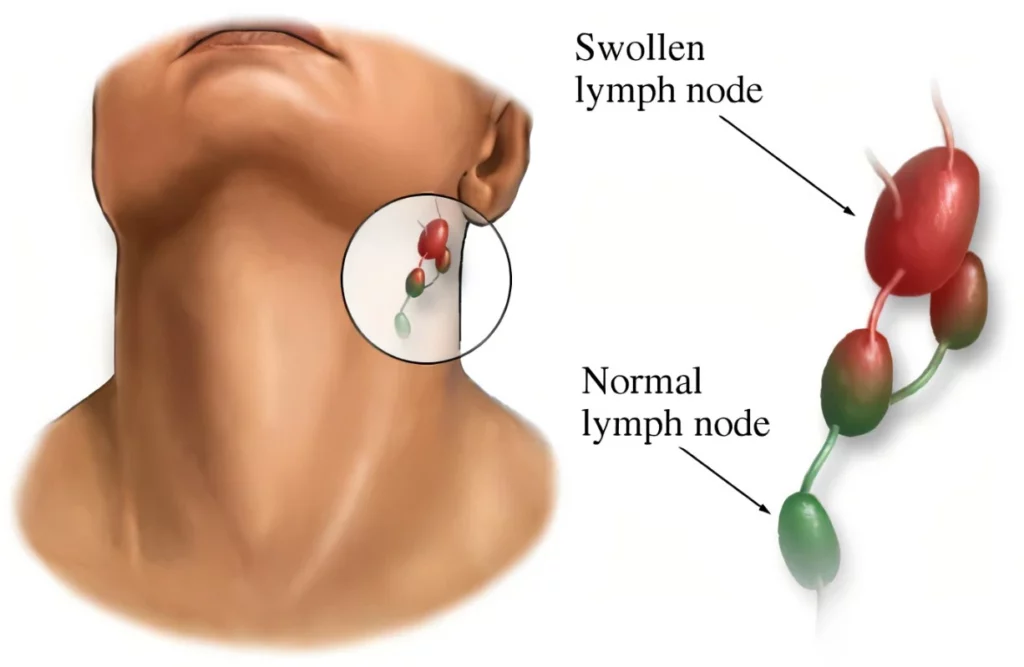

wordpress-seo domain was triggered too early. This is usually an indicator for some code in the plugin or theme running too early. Translations should be loaded at the init action or later. Please see Debugging in WordPress for more information. (This message was added in version 6.7.0.) in /home/sehatnagar.com/public_html/wp-includes/functions.php on line 6114
Swollen lymph nodes, also known as lymphadenopathy, can be a source of concern and discomfort. While infections are often the primary culprits behind this condition, allergies can also contribute to the enlargement of lymph nodes. This comprehensive article explores can allergies cause swollen lymph nodes , the intricate relationship between allergies and swollen lymph nodes, delving into the underlying mechanisms, common allergens that trigger such responses, symptoms, and essential information for seeking medical attention when needed.

Lymph nodes are small, bean-shaped structures distributed throughout the body as part of the lymphatic system, which plays a crucial role in immune function. Allergies, on the other hand, are immune responses to substances that are usually harmless. When an allergen, such as pollen or certain foods, enters the body, the immune system may perceive it as a threat, leading to various allergic reactions.
Allergic reactions initiate an immune response characterized by the release of histamines and other chemicals. These substances trigger inflammation, causing the blood vessels near the affected area to become more permeable. This increased permeability allows immune cells to reach the site of allergen exposure. In cases of severe allergies, the immune system’s response can lead to lymph node enlargement. This is due to the migration and accumulation of immune cells in the lymph nodes, causing them to swell as they work to filter and neutralize allergens.
Seasonal allergies, such as hay fever, can lead to swollen lymph nodes in areas like the neck and throat due to the immune system’s response to inhaled pollen.
Certain food allergies can trigger localized allergic reactions, such as swelling in the mouth or throat, which might extend to nearby lymph nodes.
Allergic reactions to insect stings or bites can cause rapid immune responses, resulting in lymph node enlargement near the site of exposure.
Swollen lymph nodes from allergies might feel tender or painful to the touch.
Allergic reactions often come with other symptoms like sneezing, itching, hives, and watery eyes.
Allergy-induced lymph node swelling is usually less severe and is often accompanied by typical allergy symptoms, while infection-related swelling might cause more severe symptoms like fever and pus formation.
If swollen lymph nodes persist for more than a couple of weeks without improvement, a medical evaluation is recommended.
Rapidly progressing symptoms such as difficulty breathing, swelling of the face or throat, and a drop in blood pressure could indicate anaphylaxis, a life-threatening allergic reaction requiring immediate medical care.
Seeking a healthcare professional’s opinion is crucial for accurate diagnosis and appropriate treatment.
A doctor will conduct a thorough examination and inquire about allergy history to determine the cause of swollen lymph nodes.
Imaging studies like ultrasounds or biopsies might be ordered to assess the extent of lymph node enlargement. Blood tests can also provide insights into allergic sensitivities.
Managing allergies through allergen avoidance, medications (antihistamines, decongestants), and immunotherapy can help prevent allergic reactions and subsequent lymph node swelling.
Identifying and avoiding allergens is a primary approach. For pollen allergies, staying indoors during peak pollen seasons can help.
Antihistamines can help control allergic reactions, while decongestants relieve congestion and swelling.
Allergen-specific immunotherapy (allergy shots) can desensitize the immune system over time, reducing the severity of allergic reactions.
Maintaining good hygiene can prevent skin infections that might lead to lymph node swelling.
Eating a well-balanced diet rich in nutrients supports overall immune health and may help reduce the severity of allergic reactions.
Stress can exacerbate allergic responses, so stress-reduction techniques can be beneficial.
While wandering can allergies cause swollen lymph nodes ,swollen lymph nodes can be alarming, understanding the connection between allergies and lymph node enlargement provides valuable insights for effective management. By recognizing the mechanisms, common allergens, symptoms, and appropriate times to seek medical care, individuals can navigate their allergies with greater confidence and achieve better quality of life. Always consult with healthcare professionals for accurate diagnosis and personalized treatment strategies.